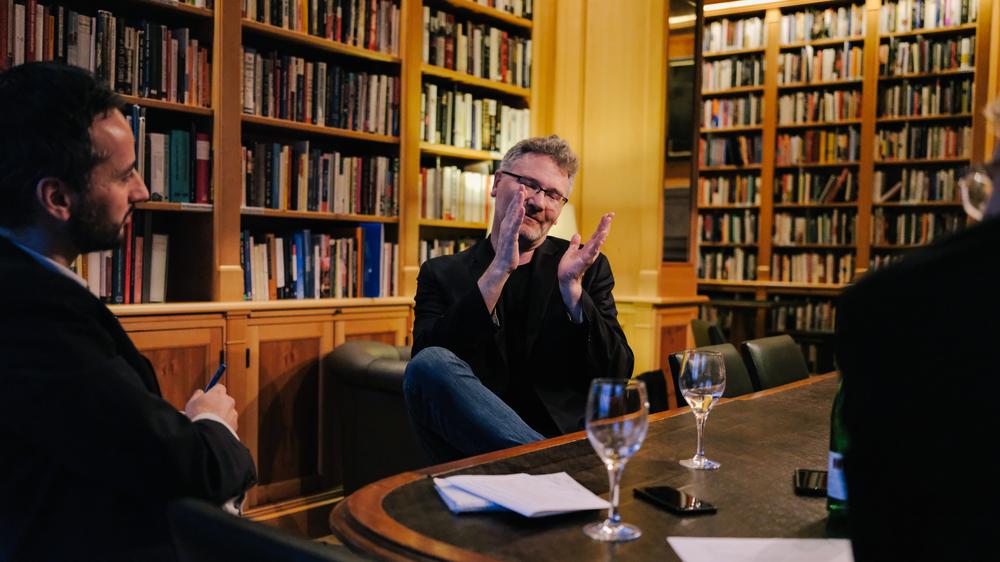Lesen Sie diesen Text auf Deutsch
Adam Tooze is a British economic historian. He teaches at Columbia University in New York following previous stops at Yale and Cambridge. His book "Crashed: How a Decade of Financial Crises Changed the World" was published in 2018.
ZEIT ONLINE: Mr. Tooze, are we
on the brink of a global trade war?
Adam Tooze: It’s a kind of cold
trade war, but it didn’t start with the election of Donald Trump as U.S.
president. It’s been around for several years.
The world has to find a way to address the great global imbalances – for
example between the European Union and the United States. Furthermore, we have
to decide how to integrate the Chinese colossus and its unprecedented economic
momentum into the global economic system. Tensions between Chinese state
capitalism and Western democratic capitalism are to be expected.
ZEIT ONLINE: Is protectionism
the right path in this kind of difficult situation?
Tooze: No, of course not.
Donald Trump is a reckless actor in an already fraught system. The world has
rarely experienced the kind of absurd policies that are currently coming out of
the White House. Similar sorts of things have come from the U.S. Congress in
the past, but such an approach to politics never has never before come from a
White House administration.
ZEIT ONLINE: The departure of
Gary Cohn and Rex Tillerson means the loss of two people in the U.S. government
who stood for a more moderate approach. Who are the ideologues in the
background pushing Trump’s policies?
Tooze: There are entire
groups of different actors – for example, the brothers David and Charles Koch
and their energy company. They wanted the U.S. to pull out of the international
climate agreement and they got it. But the Koch brothers didn’t expect the
protectionism that Trump is now pursuing. One proponent of this policy is the
lesser-known U.S. trade representative, Robert Lighthizer, a smart attorney who
already in the 1980s led tough trade talks with the Japanese for the Reagan
administration. Apart from Lighthizer, there’s also Peter Navarro. He regards
China as something of an archenemy. Both of them see world trade less as a
system of different rules and more as a battlefield upon which economic power
is measured.
Trump wants to fulfill an historic mission. His narrative is simple: Since the 1970s the American economy has been overwhelmed by globalization.
ZEIT ONLINE: The rhetoric about
unfair trade is supposed to feed the fear of Chinese supremacy?
Tooze: Yes. But China’s
development is also something completely new and historic in terms of its
dimension and speed. Global steel capacity alone has doubled over the past 15
years. Aluminum production has almost tripled over the course of a decade.
Naturally that has an impact on the global distribution of labor, on jobs in
the United States and the rest of the world. But sealing yourself off and starting
what amounts to a cold war won’t solve the problem.
ZEIT ONLINE: Will the
appointment of Lawrence Kudlow as Trump’s new top economic advisor change
anything? He is regarded as a proponent of free trade.
Tooze: One could almost
conclude that Trump wants to create a balance between globalists and
nationalists among his advisors. Above all, though, he wants to be surrounded
by sycophants. Kudlow is one, and he’s also a lightweight.
ZEIT ONLINE: What motivates
Trump – aside from what his advisors are telling him?
Tooze: He wants to fulfill
an historic mission. His narrative is simple: Since the 1970s the American
economy has been overwhelmed by globalization. And the previous governments in
Washington have done nothing to defend it. He implies that his predecessors
were stupid. He says, for example, that they were terrible at negotiating free trade
agreements. That’s why the country now needs a government that will finally
take action.
Lesen Sie diesen Text auf Deutsch
Adam Tooze is a British economic historian. He teaches at Columbia University in New York following previous stops at Yale and Cambridge. His book "Crashed: How a Decade of Financial Crises Changed the World" was published in 2018.
ZEIT ONLINE: Mr. Tooze, are we
on the brink of a global trade war?
Adam Tooze: It’s a kind of cold
trade war, but it didn’t start with the election of Donald Trump as U.S.
president. It’s been around for several years.
The world has to find a way to address the great global imbalances – for
example between the European Union and the United States. Furthermore, we have
to decide how to integrate the Chinese colossus and its unprecedented economic
momentum into the global economic system. Tensions between Chinese state
capitalism and Western democratic capitalism are to be expected.
